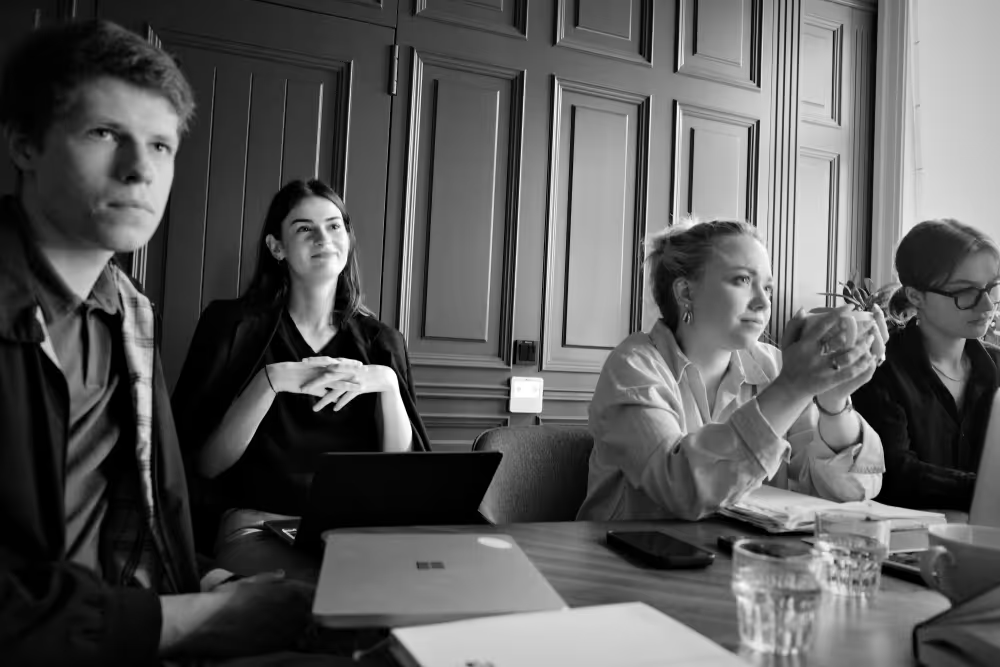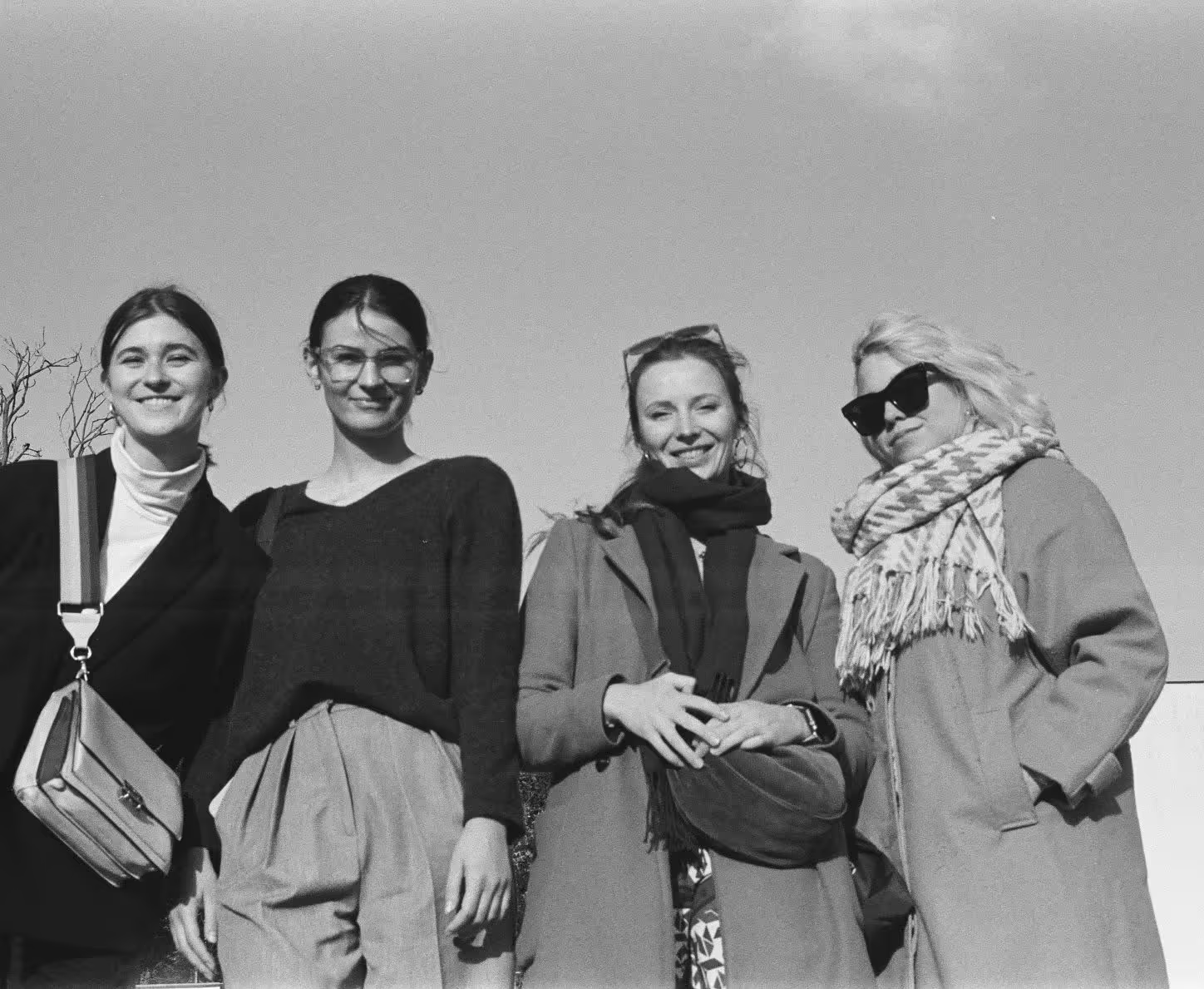25 серпня Президент Республіки Польща наклав вето на урядовий законопроєкт, спрямований впорядкувати захист і підтримку сімей, які тікають від війни. Це рішення та супроводжуюча його риторика — оголошення про те, що допомога дитині залежатиме від працевлаштування її батьків, подовження шляху до громадянства, розпалювання конфліктів щодо пам'яті — не є питанням настроїв, а холодним політичним розрахунком. Вони шкодять українським жінкам-біженкам, їхнім дітям, людям похилого віку і хворим; вони також шкодять нашим школам, лікарям і місцевим органам влади. Замість впевненості вони приносять страх, замість спокою — загрозу розлучення сімей, вторинної міграції та ерозії довіри до польської держави.
Уявіть, що ви воюєте, захищаючи свою Батьківщину, а сусідня країна ставиться до ваших дружин, матерів і дочок, як до заручниць політики.
Після рішення Президента в тисячах будинків по всій Польщі запанували шок, розчарування і почуття зради. Матері, які з дітьми і хворими батьками втекли з міст і сіл, перетворених на пил, сьогодні задаються питанням, куди їм тікати далі. Жінки, які обрали Польщу з любові й довіри, відчувають, що ця любов не була взаємною.
Дитина — це не літери у законі, а допомога, що надається на неї, не може бути важелем тиску на її матір. Солідарність не сезонна, це не примха і не мода. Якщо це правда в березні, то це має бути правдою і в серпні. Пам'ять — не палиця. Держава, яка замість того, щоб лікувати рани історії, використовує примітивні символи, не будує спільноти. Держава не може бути вуличним театром. Серйозна держава обирає відповідальність, а не політичне шоу: процедури, чітку комунікацію, захист найвразливіших.
Ми, польські жінки — матері, дружини, дочки, сестри й бабусі — говоримо прямо: ніхто від нашого імені не має права ставити умови жінкам, які тікають від війни. Ми не згодні, щоб біль і страждання людей, які потребують нашої підтримки, перетворювалися на паливо для суперечок. Ми не дозволимо руйнувати довіру, на якій базується спільнота. Це рація держави і наша совість. Саме мости, а не стіни, роблять сусідів союзниками, а передбачуване і справедливе право й мова поваги зміцнюють безпеку Польщі більше, ніж популістські вигуки з трибуни.
Європа, а отже і ми, висловилася за безперервність захисту цивільних осіб, які втекли від агресії. Наш обов'язок — дотриматися свого слова. Це означає одне: публічно, чітко і без двозначності підтвердити, що сім'ї, які довірилися Польщі, не прокинуться завтра в правовому вакуумі; що дитина не буде покарана за те, що один з її батьків працює; що мова влади не буде ділити людей на «своїх» і «чужих». Для дитини та її самотньої матері закон має бути щитом, а не інструментом примусу до лояльності й покори. Політика має бути службою, а не видовищем.
Ми закликаємо вас, хто створює закони та представляє Республіку, відновити впевненість у захисті та відкинути слова, які стигматизують, а не захищають. Нехай закони служать людям, а не політичним іграм. Нехай Польща залишається домівкою, в якій мати не мусить питати: «Куди тепер?», бо відповідь завжди буде такою: «Залишайся в країні, яка тримає слово».
Це не суперечка про юридичні технічні деталі. Це питання про обличчя Республіки. Чи буде вона державою слова, яке дотримується, чи державою слів, кинутих на вітер. Чи ми станемо на бік матерів і дітей, чи на бік страху.
Лист можуть підписати тільки польки. Перешліть його знайомим польським жінкам. Щоб підписати лист, достатньо заповнити форму
____________________________________
Підписано:
польські жінки – матері, дружини, дочки, сестри, бабусі.
Данута Валенса, перша леді РП в 1990-1995
Йоланта Кваснєвська, перша леді Республіки Польща в 1995-2005 роках,
Анна Коморовська, перша леді Республіки Польща в 2010-2015 роках,
Аґнєшка Голланд, кінорежисерка,
Кристина Янда, акторка
Ганна Мачинська, доктор юридичних наук, колишня заступниця Уповноваженого з прав громадян
Яніна Охойська, громадська діячка, астронавтка
Майя Коморовська, акторка
Домініка Кульчик, меценатка
Ольга Токарчук, письменниця і лауреатка Нобелівської премії
Абрамович Марта
Абрамович Марта, письменниця
Алексовська Дорота
Андрейс Сусанна
Апалков Анна
Арашкевич Агата, доктор літературознавства, Париж, Брюссель
Арнольд-Качановська Агнешка, режисерка, документалістка
Августинек Катажина, активістка
Бадовець Богна, лікарка-психіатр
Байда Агнешка, кураторка
Банасіак Дорота - психологиня
Баранович Беата
Барановська Божена - акторка, педагогиня, режисерка
Баранська Наталія
Баранська-Морзи Дагмара
Барчик Анна адвокатка
Баррі Ізабела Йоанна, бібліотекарка, журналістка
Барчак Агата
Бартковіак Агнешка
Бартниковська Ева, журналістка
Бастек-Бальцерек Кася
Батко-Толуць Катажина, член правління Фонду для Польщі, при якому діє Громадянський фонд імені Людвіки та Генріка Вуйців
Батор Ева, Гданськ
Батор Евеліна, літературознавець, Варшавський університет
Баторчак Анна
Бауман Беата
Бауман Катажина, вчителька
Бауман Магдалена
Бауміллер Анна - сценограф
Бауміллер Йоанна - мати, бабуся
Бауміллер Катажина, архітектор
Баумріттер Анна, психотерапевт
Бачинська Анна мати, вчителька, полька, європейка, жінка
Беднарчик-Кшижовська Домініка, актриса Театру ім. Юліуша Словацького в Кракові
Беднарек Міхаліна - журналістка Gazeta Wyborcza
Біла Аліція, художниця
Біласевич Рената, дочка, мати, вдова
Білас Катажина, журналістка
Білська Магдалена, громадська діячка
Біронська-Лах Беата, директорка «Україна! Кінофестиваль»
Білік Юстина, сценаристка
Біньчак Галина, журналістка
Бінька Анна, Асоціація «Етнографічна майстерня»
Блащак-Банасіак Анна - юристка з прав людини.
Блащик-Вархол Ева, громадська діячка, правозахисниця
Блонська Агнешка, режисерка
Бохінська Антоніна, підприємниця
Богачик Мартина, громадська діячка, Фонд «Освіта для демократії»
Богдан Ева
Богданович Мілена юрисконсульт
Богобович Анна
Богуцька Юлія
Богуцька Літинська Ельжбета, вдова Яна Літинського
Богуцька Тереза
Богуцька-Саковіч Йоанна, магістр філології, логопед
Богуславська Юлія, президент Фонду «Українка в Польщі»
Боркевич Агнешка, германістка, культурна аніматорка, психологиня
Боровець Магдалена, психологиня, мати трьох дітей.
Боровська Беата
Босацька Катажина, тележурналістка
Брунти Агата
Брзістовська Анна
Брзозовська Лідія, пенсіонерка
Будзинська Наталія, письменниця
Буян-Жмуда Ельжбета, вчителька
Бунлер Анна, Варшавський університет
Бурнат Каліна, мама, нейробіолог
Бютнер-Завадзька Маłgorzata
Бутримович Юстина - активістка
Билов Катажина
Капінська Ева
Чаменя Катажина вчителька та активістка
Хенчке Наталія
Хенч Анна - Фонд «Світ у наших руках»
Хіміак Юлія, мама, педагог, перекладачка
Хмілевська Богна, педагог, Варшава
Хмілевська Гражина, історик
Хмілевська-Шлайфер Гелена
Магдалена Хрщонович, головна редакторка OKO.press
Сильвія Хутник, письменниця
Сильвія Хведорчук, письменниця
Анна Хилак
Марія Хилінська
Уршула Хирович
Йоанна Цеплуха
Марта Кобел-Токарська
Ельжбета Коломбєр
Марта Коннор
Люцина Цвях
Циран-Юрашек Кароліна мати, громадська діячка, тренерка та консультантка неурядових організацій
Чарнацька Агата, філософка політики
Чарнковська-Лістось Рената, кінопродюсерка, громадська діячка, лідерка Ініціативи «Жінки кіно»
Чехмановська Данута
Чердерцька Агнешка, Загальнопольський страйк жінок
Черська-Томас Йоанна, членкиня міської ради Бідгоща
Ченстік Анна
Чуба Беата (викладачка, мати, громадянка)
Чудець Йоанна, перекладачка
Чварногог Каліна, членкиня правління Фонду «Окалення»
Чиж Магдалена, президентка Фонду «Демократія»
Дагмара Сядлак Кінга, віцепрезидентка Фонду «Активна демократія»
Дарська Бернадетта, літературознавець, літературний критик
Домбровська Юстина, психотерапевт, письменниця, багаторічна головна редакторка щомісячного журналу «Дитя»
Домбровська Кристіна, поетеса
Домбровська Паула
Домбровська-Кухна Моніка
Дея Агнешка, соціологиня, волонтерка, лауреатка I редакції премії «Портрети сестринства»
Дембінська Рожа
Демська-Пєрзхала Зофія
Демська-Ольбрихська Кристіна
Дереньовська Кінга, журналістка
Дембська Кінга, кінорежисерка, сценаристка
Дембська Ольбрихська Кристина
Дячук Тереза вчителька
Дідушко-Зиглевська Агата
Дімітрова Цвета, психотерапевтка
Добровольська Ізабела - редакторка, графік
Анна Додзюк, антикомуністична опозиціонерка
Юстина Домагала
Юлія Доманська, студентка Академії музики і театру в Лодзі
Данута Дов'ят, перекладачка
Івона Дучмаль, художниця
Едита Дуда-Олеховська, сценаристка
Анна Дудек, журналістка
Агнешка Дудзінська, Варшавський університет
Анна Дунієвич, активістка, ініціатива «Наш речник», громадянська ініціатива «Ми хочемо повного життя!»
Ганна Дуральська
Юстина Дуряш-Булхак – співробітниця неурядової організації
Катажина Двілінська. Програмістка, клієнтка та сусідка Ukrainek в Польщі
Моніка Дзекан
Дзенніак-Пуліна Даніела, викладачка, соціологиня
Дзержговська Анна Наталія, вчителька, перекладачка
Дзік-Макара Катажина
Дзюбандовська Олександра
Дзвігонь Агнешка – звичайна Полка
Джон-Озімек Беата, журналістка
Ейме Агнешка
Ельберт Рената
Емілія Голос
Енгелькінг Анна, професорка Інституту славістики ПАН
Ева Ева, журналістка, режисерка документальних фільмів
Фальковська Малгожата, приватна підприємницька діяльність (консультантка)
Фариновська Малгожата, Громадяни Республіки Польща
Федас Анна - координаторка міжнародних проектів у громадських організаціях
Федерowicz Ганна
Фялковська Каміла, Варшавський університет
Фідлер Міленіа, ректорка Кіношколи в Лодзі
Фіют-Дудек Агата, медіазнавець
Філіпковська Моніка , юристка, активістка
Філіппович Марія, пенсіонерка, Світська школа
Флоріанчик Зофія
Фоміна Йоанна, соціологиня, професорка Інституту філософії та соціології Польської академії наук
Форись Агнешка, практик культурної освіти, авторка книги «Близько до тексту»
Френкель Моніка
Фричковська Анна, письменниця
Фус Лена
Габала Дорота
Габриль Ева
Гах Катажина
Гайвончик-Прушинська Катажина, адвокат, доктор
Галазка Аліна
Галчинська Аліція
Ганович Йоанна
Ганович Марія, філолог, страховий агент
Ганович Марія, філолог, страховий агент
Ганьчарчик Іга, драматург, викладачка АСТ
Ганьчарчик Мая, перекладачка, популяризаторка літератури
Гандек Анна, візуальна художниця, театральна майстриня
Гепперт Беата, перекладачка
Гейштовт-Ржевуська Олександра
Гєрак-Оношко Йоанна, письменниця
Гєрат-Бірон Божена
Гінтовт Катажина, художниця, мати і бабуся
Глосовіц Моніка, Університет Сьомьог, дослідниця, активістка, мама
Гловцька Анна, суддя Окружного суду в Кракові у відставці.
Глуська-Дюренкамп Моніка, журналістка
Гмітерек Віслава, бібліотекарка на пенсії
Гмітерек-Заблоцька Анна, журналістка
Гнациковська Віолетта
Гоерке Наташа, письменниця
Анна Гольчинська
Агнешка Гондас, професорка Університету Лодзь
Габріела Марія Голуб
Моніка Голебівка
Майгожа Голota, журналістка, репортерка
Майгожа Горчинська, Університет Вроцлава
Горєцька Малгожата
Гурєцька-Гранат Катажина
Гурняк-Дзіоба Дарія, юрисконсульт
Грачик Аліція вулична опозиція
Град-Мізгала Анна, активістка, громадська діячка, депутатка міської ради Przemyśla
Гралак Міхаліна
Грегорчик-Абрам Сильвія, адвокат, захисниця прав людини
Грен Олександра
Грудзька Беата
Гроховська Ева, музикантка, педагогиня, докторка гуманітарних наук
Гродська Йоанна
Грунвальд Барбара, пенсіонерка
Григієр-Коłodziejczyk Стефанія - пенсіонерка, філологиня-поляністка
Гrzegrzółka-Jóźwiak Беата
Гржелак-Сарнович Галина
Гутowska-Іббс Марія
Гутры-Булик Дорта - мати, вчителька
Гузек Анна, людина, як жінка, мати (прийомна), а також як президент Фонду підтримки та розвитку сім'ї «Zielone Wzgórze»
Гузик Дорота
Гузінська Кароліна
Гвізда-Куліг Данута
Халфар-Барц Анна
Галіцька Катажина, Фонд «Милі люди»,
Гартвінська Альдона, журналістка, волонтерка,
Хеммерлінг Катажина, соціологиня, підприємниця
Герета Ядвіга, журналістка тижневика «Tygodnik Zamojski», волонтерка
Герун Вікторія, Міська рада Любліна
Гірна-Будка Магдалена, лінгвістка, активістка, викладачка Варшавського університету
Гіршфельд Олександра, Ентузіастки World
Hoffman Ела
Holland Агнешка, кінорежисерка
Hołoweńko Ельжбета, художниця, викладачка груп для літніх людей в MSN
Homel-Ficenes Ксенія, соціологиня, Варшавський університет
Горди Мірослава
Гринишин Богна, директорка Бюро наукової досконалості ПАН
Хулі Марина, журналістка
Ільська Агата
Яблонська Ела
Якевич Йоланта, Асоціація «Сілезькі перлини»
Ягодінська Ева
Яклевич Кароліна, художниця, викладачка Вроцлавського політехнічного університету
Кароліна Яклевич, художниця, викладачка Вроцлавського політехнічного університету
Ірена Якобік - пенсіонерка
Йованка Якубек-Лалік, Варшавський університет
Якубович-Маунт Танна психотерапевт
Янава-Фида Малгожата
Янц Ренета
Янчевська Марія Данута, пенсіонерка, вчителька
Янда Кристина, актриса
Яніак Дорота
Яніак Дорота
Яніцька Катажина
Яніковська Інгеборга, експертка з питань підтримки громадських організацій
Янін Зузанна, художниця візуальних мистецтв
Янішек Ева
Янкевич Зофія
Янковська Рената
Янович-Урбаняк Ганна (психологиня)
Яновська Рената
Яроць Данута
Яросік Ванда
Ярошинська Барбара - вчителька
Ясіновська Ола, графік
Яворська-Рóg Інгеборга, редакторка
Єсіс-Полевська Йоанна, голова правління
Йоанна Геландер, письменниця, фотографка, перекладачка
Юнг Леокадія, активістка
Юраш Евеліна – директорка Бюро художніх виставок у Кросні, мама
Юраш Ізабела
Юста Олександра, акторка
Кабара-Дзядош Марта
Кацпрак Кароліна, редакторка
Кацпрак Анна, психологиня
Качковська Катажина, службовець
Качмарк Моніка, фармацевт
Качмарк-Слівінська Моніка, професорка Варшавського університету, науковиця
Качинська Діана, підприємниця, активістка, наставниця
Каларус Кінга, вчителька
Каліна Охедзан Юстина
Калмус Божена
Камінська Анета, поетеса, перекладачка української поезії
Камінська Анна, активістка
Камінська-Мауругеон Магдалена, перекладачка
Канторська Олександра
Карніол Йоанна, адвокатка
Каронь Олександра: художниця
Карван-Макош Патриція, психотерапевтка
Касіца Катажина, режисерка.
Касіца Патриція, адвокатка, активістка за покращення гендерної рівності
Касперська Йоанна, акторка, громадська діячка
Кава Йоланта, президентка Фонду Геремка
Кадзела Катажина феміністка, мати, бабуся, пенсіонерка
Каколь Марія
Келлер-Хамела Марія
Кеннеді Агнешка, промоутерка культури та менеджерка артистів
Кертичак Наталія, членкиня правління Фонду «Освіта для демократії»
Кіцінська Магдалена, журналістка
Кєтлінська Кася
Кяк Тереза
Кяк Ула, режисерка
Кійовська Олена
Кім Рената, журналістка
Кіндлер Марта, соціологиня, Варшавський університет
Кіршке Марина, інженер
Кіша Соня, письменниця
Клечевська Мая
Клечковська Ева
Кліх Олександра, редакторка, письменниця
Кліх-Ключевська Барбара, історикиня, Янгвінський університет
Клімашєвська Ада , активістка, «Рожева скринька»
Клімкевич Йоланта
Клочковська Мілена, юристка, членкиня правління Асоціації «Homo Faber»
Ключевська Агата, активістка з прав людини
Коберська-Дембець Дорота - пенсіонерка, викладачка польської мови
Коцейко Магдалена, соціологиня та соціальна політик
Кохнович-Канн Анна, письменниця, публіцистка, документалістка
Коцанович Дорота , ГОЛОВА РАДИ ДИСЦИПЛІНИ Факультет історичних та педагогічних наук
Колвас Кристина
Коłodziej Joanna, вчителька
Коłodziejczyk Kaya - художниця-хореограф
Колтунович Анна, Фонд Агори
Коморовська Анна, перша леді Республіки Польща в 2010-2015 роках
Коморовська Мая, актриса
Кондратович Марзанна, рестораторка
Копець-Кубіт Магдалена, редакторка, мати двох дочок
Копка-П'ятка Малгожата, президентка асоціації FemGlobal. Жінки в міжнародній політиці
Копицінська Гелена Комітет захисту демократії
Кордеуш-Зегадлович Ельжбета, психологиня, Краків
Корольчук Ельжбета, професорка Варшавського університету
Косецька Кароліна, драматерапевтка, активістка протестного руху «2119»
Косецька Катажина
Косік Віслава
Косінська Божена
Косінська Івона
Коссовська Барбара, мати, бабуся
Ковальче-Павлік Анна, викладачка, літературознавиця, перекладачка, мати трьох дітей
Ковальчик Анна
Ковальчик Дорота, лікарка
Ковальчик Еліза, жінка, мати чотирьох дітей, психотравматологиня та рятувальниця
Ковальська Беата, професорка Янгівського університету
Ковальська Сильвія, громадська діячка, Фонд Autism Team, Ініціатива «Ми хочемо ціле життя»
Козьол Йоланта
Козловська Магдалена, викладачка ВУ
Кознєвська Ева, професорка, науковиця
Країнська Агнешка освітянка, лідерка діалогу
Крайчинська Мірослава
Краківська Катажина, докторантка, Докторська школа соціальних наук Лодзького університету
Красовська Модлінгер Ельжбета, комп'ютерна графік, громадська діячка
Кравченко Олена
Кравчик Йоанна, директорка CORRECTIVE.Europe
Кравчик Марія, психотерапевтка, редакторка
Кравчик Моніка
Кручинська Марта
Крич Мая
Крич Меланія, режисерка та активістка
Криницька Кристина
Криницька Наталія
Кринська Катажина
Кжемпек Корнелія
Кубіак Катажина, перекладачка
Кубицька Агата
Куціль-Фридришак Йоанна
Кучинська Ірена журналістка, блогерка, пенсіонерка-вчителька
Куфель Моніка, президент Фонду Десяти Талантів на користь Театру BARAKAH, акторка, сценографка
Куїк Кама художниця та педагог
Кулаковська-Мроз Магда, опозиціонерка, художниця, мама та бабуся
Кульчик Домініка
Куліговська Данута, Газета Виборча
Кулаковська Олександра - сценаристка та кінорежисерка
Кунце Пауліна, гуманітарна працівниця
Куронь Данута
Куровська Корнелія, Фонд BORUSSIA
Кусінська Барбара
Кусінська-Зребець Александра
Кустра Ганна, Фонд Загальнопольський страйк жінок, голова Рисницької ради жінок
Кушнір Богна, громадянська активістка
Кузька Юлія
Кваснєвська Йоланта, перша леді Республіки Польща в 1995-2005 роках
Квятковська Анна, редакторка «Gazeta Wyborcza»
Квятковська Марта, юристка
Квятковська-Яблонська Кристіна, голова правління Фонду імені Ірени Квятковської
Квятковська-Ратайчак Марія, філолог, Академія Мартіна Адама в Познані
Квєцінська Ельжбєта, доцент, Інститут славістики ПАН
Квіцінська Марія, мати трьох дітей і бабуся восьми онуків
Лах Диба, документалістка
Лалак-Шавіель Лідія
Ландсберг Ева
Ларента Анна - вчителька
Ласковська Йоланта - педагог
Ласковська Маржена
Ласота-Сіргі Олександра
Лех Кася, доцент, Амстердамський університет
Лех-Кравчик Малгожата
Легчиліна Ольга
Лемпарт Марта, Загальнопольський страйк жінок
Лесяк Магда, активістка, Комітет захисту демократії
Лесіак Зузанна, активістка
Лещинська Катажина, перекладачка, голова Асоціації на підтримку діалогу Tropinka
Лещинська Магдалена
Левандович Анна
Левандовська Агата, викладачка Амстердамського університету
Левандовська Катажина, академік, кураторка, активістка
Левандовська-Ягелло Анна
Левіцька Ева
Левко Гражина, психолог
Лінде-Усікнєвич Ядвіга, Варшавський університет.
Ліпчак Олександра, репортерка, письменниця
Ліпманн Малгожата, акторка, викладачка.
Ліпська Ельжбета - лікарка, рятувальниця, письменниця
Ліпська Ізабель
Ліс Рената - письменниця
Ліс-Овчарек Анна
Літвінович Малгожата, професорка Варшавського університету
Луберадзька-Груца Йоанна, Фонд «Польські жінки можуть все»
Катажина Любінецька-Рожило, членкиня Семінарського ради Нижньосільського воєводства
Анна Любовська Менорка Лідерків
Агнешка Лутостанська
Емі Лах – художниця
Юстина Лаговська – сценографка, режисерка
Дарія Лавринов
Анна Лазар
Магдалена Лазаркевич, режисерка
Барбара Лазовська
Дорота Лазовська
Ева Лєнтковська, професор, колишня омбудсменка
Ева Лojkowska, академік Гданьського університету
Агнешка Лозінська
Кінга Лозінська, Комітет захисту демократії
Ева Лучинська, голова, Варшава
Онората Лукашевська
Кристіна Личаковська, архітекторка
Беата Лижва-Соколь, фоторедакторка Sestry.eu, керівниця відділу виставок DSH
Ганна Мачинська, докторка юридичних наук, колишня заступниця омбудсмена
Кароліна Мацієшек – режисерка, викладачка Академії театральних мистецтв у Кракові, філії у Вроцлаві
Ева Мацієвська-Мрочек, антропологиня, дослідниця дитинства
Івка Маціошек, активістка
Вікторія Магнушевська,
LexQ
Май-Стахира Ельжбета
Майхжак Ядвіга
Майчик Йоанна, академік, ВР
Маєвська Бетті, іберистка, вчителька в середній школі
Маєвська-Цесля Ельжбета, мама і бабуся, вчителька і активістка
Макаревич Ірена
Маковіцька-Пастусяк Агнешка, психоаналітик
Маліновська Красич Марія, громада
Маліновська Марія
Малішевська-Мазек Йоанна
Малой Пауліна - керівниця Спільного секретаріату Interreg Польща-Саксонія
Малашук Моніка
Малецька Уршула
Магожата Коморковська
Маньковська Ева
Марчевська Маржена, викладачка Університету Яна Кохановського в Кельце
Маркель Малгожата
Маркевич Дорота
Марковська Сильвія
Матерська-Сосновська Анна, Варшавський університет, Фонд Баторего
Мазіарська Анна, активістка, членкиня Ради Асоціації Конгресу жінок, співголова Варшавської Ради жінок
Мазюк Анна, письменниця, репортерка
Мазур Ельжбєта
Мазур Марія, ректорка Вищої школи підприємництва та адміністрації в Любліні
Мазур-Вєжанська Ельжбєта
Мазусь Марта, репортерка
Мехелевська-Гриз Йоланта
Медведська Марія
Мендик Агата, вчителька
Менцфаль Сильвія
Менкарська Анна
Менкарська Ева
Міхалік Моніка
Міхаловська Йоанна
Міхаловська Катажина
Мєдзінська Анна, активістка руху «Громадяни Республіки Польща», підприємниця
Мєржинська Анна, аналітик, OKO.press
Мієсціцька-Ліддердейл Анна, перекладачка
Мілчевська Анна
Мілчевська Анна
Міркес-Радзівон Анна, редакторка, голова асоціації «Меморіал Польща»
Міронович Ізабела, урбаністка
Міровська Вероніка - голова Фонду Grand Press
Міскурка-Шоенех Данута
Модржеєвська Ядвіга (Ягода)
Моленда Аліція Магдалена, активістка загальнопольського Страйку жінок
Моленда-Здєх Малгожата, професорка СGH
Моледа-Здєх Малгожата, соціологиня та політологиня
Моравська Катажина, мама, активістка, сестра
Мосей Йоанна, головна редакторка Sestry.eu
Мосінгевич Ельжбета, пенсіонерка
Москаль Анна, актриса, викладачка
Мошчинська Уршула
Мроз Ева
Мрук Кристіна, пенсіонерка
Муха Романа, президент Фонду «Місце на Землі»
Мулярчик Анна
Мурк Вероніка, письменниця
Мусял Магдалена
Мусял Магдалена
Мусіелак Марія – пенсіонерка-вчителька
Мускала Габріела - актриса, драматург, сценарист і режисер
Мускала Моніка, письменниця
Наганська-Пілак Малгожата
Налепка Дорота, біолог, емерит
Наркевич Ева, реставратор творів мистецтва
Навроцька-Олійнічак Пауліна, журналістка
Наврот Анна
Ніденталь Кароліна, перекладачка
Нідзведзь Анна - етнографка/культурна антропологиня
Невядомська Магдалена, академічна бібліотекарка, перекладачка
Невєра Ельвіра, кінорежисерка та волонтерка
Ніжегородцев Анна, ем. проф. ЮЖ, англістка
Ноцюнь Агата
Ноцюнь Агата
Новацька Агнешка
Новак Аліція, професорка Янгрейського університету
Новак Дорота, редакторка
Новак Ядвіга
Новак Марта, журналістка
Новіцька-Даніель Тереза
Новороль Марія, архітекторка
Нюгрен Дорота, журналістка, редакторка
Оброцька-Ратайчак Івона
Охойська Яніна
Охойська Яніна
Охіа-Новак Маргарет
Олех Йоанна - письменниця
Омаковська Івона
Опонович Кароліна, головна редакторка видавництва «Агора для дітей»
Орловська Ага - вчителька математики, ювелір
Орловська Ага, вчителька математики, ювелір
Орловська Габріела
Осінська Пауліна, перекладачка аудіовізуальних засобів
Осіпіак Беата, фармацевт, пенсіонерка
Осмюльська Ельжбета
Осмюльська-Метрак Анна, перекладачка
Островська Алісія соціолог, пенсіонерка, мама
Островська Ева
Островська Йоанна Інститут культурології Університету імені Адама Міцкевича в Познані
Острожанська Дорра - бізнес-тренерка, наставниця, феміністка та історикиня
Осух Кінга акушерка
Овчарек Олександра
Овчарек Ганна
Овчарек-Стаськевич Катажина, Рівновага
Пацевич Аліція, експертка з освіти, мережа SOS для освіти
Палінська Беата, вчителька
Палінська Міхаліна, психологиня
Папірська Барбара
Папрота Малгожата
Пасірська Агнешка, графічна дизайнерка
Пасіковська Анна вчителька
Павліковська Анна, декан Окружної ради адвокатів
Павлукевич Томецька Анна
Павловська Катажина, журналістка, редакторка
Пекуль-Кудельська Магдалена, хімік, Громадяни РП
Петеленц Барбара, хімік, пенсіонерка, волонтерка
Петрайтіс-О'Ніл Ельжбета, Асоціація «Відкрита Республіка», перекладачка
Марта Петрусевич
Александра Петриковська, юрисконсульт, докторантка та засновниця фонду «Від кордону до житла»
"
Пентікевич Моніка режисерка
Пенкальська Марта, бібліотекарка,
Пенкала Йоланта - громадська діячка, прийомна сім'я, радниця
Пясецька Ева
Пясецька-Нець Ольга, Фонд «Я люблю Дембники»
Пятка Марія - візуальна художниця та викладачка університету
Агнешка Пєхоцінська, психолог
Моніка Пєцюл
Агнешка Пєкарська
Ванда Пєрса
Агнешка Пєрзак, громадянка, менеджер у фінансовому секторі.
Марта Пєтрашун, терапевт
Бася Пєтрущак, педагог і автор
Ева Пілавська – директорка Театру Повсzechny в Лодзі, художня директорка Міжнародного фестивалю приємних і неприємних мистецтв
Беата Пілецька-Рожицька
Аніта Піотровська, кінокритикиня, «Tygodnik Powszechny»
Пьотровська Йоанна, президентка фонду Feminoteka
Пьотровська-Марчева Моніка, Історичний інститут Вроцлавського університету
Пірогowska Ева, викладачка Амстердамського університету, мати чотирьох дітей
Плага-Гловцька Віола, художниця, активістка
Плавго Малгожата, психологиня, редакторка
Плутецька Малгожата
Пахтій Памела - сценаристка
Подчервінська Марта, мама трьох дітей
Подгурна Катажина
Подлесна Ельжбета, психологиня, активістка
Агнешка Подоловська
Ірина Полець-Герус, кафедра польсько-українських студій, Ягеллонський університет
Марта Полтович-Бобак, археолог IA UR, учасниця руху «Громадяни Республіки Польща», член правління Асоціації «Фольківіско»
Джоанна Попко, активістка, мати
Порада-Лабуда Малгожата, колишня журналістка
Пошепчинська Агнешка, вчителька образотворчого мистецтва в Початковій школі № 11 у Варшаві
Потепа Анна
Потоцька Маша
Прайс Олександра, пенсіонерка
Прашалович Дорота - Інститут американістики та польських студій - Факультет міжнародних та політичних студій
Прейзнер Йоанна, викладачка
Прохвіч Марта
Прокеш Катажина, мама
Прот-Клінгер Катажина, психіатр, психотерапевт
Агата Прухнєвська, актриса, письменниця
Магдалена Прусіновська
Агнешка Прушинська
Майгожа Пржегалінська-Горачуковська, пенсіонерка, викладачка
Данута Пшепьорковська, перекладачка, соціологиня
Агнешка Пшепьорська, актриса
Катажина Пшиборська
Марія Пшиходняк
Домініка Пшиходень, активістка
Марцеліна Пшилуцька
Данута Пшивара, Гельсінська фундація
Александра Пуач
Івона Пугацевич-Ковальська
Ганна Пустула-Левіцька
Кая Путо, головна редакторка krytykapolityczna.pl
Питєль Евеліна, активістка
Квоос Марія – диригентка
Рачкевич Анна
Рачинська Ева – в.о. головної редакторки Onet Lifestyle
Радецька Аніела
Радек Патриція
Радомінська Юстина
Радзівілль Катажина, видавчиня
Ракіель-Чарнецька Валентина
Ранцев-Сікора Дорота, соціологиня, науковиця та викладачка
Ратайчак Магдалена
Ратайчак Маріка
Райхардт Івона, заступниця головного редактора New Eastern Europe
Райтер Пауліна, редакторка Wysokie Obcasy
Рейняк-Маєвська Агнешка, дослідниця, перекладачка
Рембацька Катажина, історик та педагог
Рембіалковська Агнешка, викладачка, перекладачка
Рей-Радлінська Марта
Роховська Катажина
Рочняк Дорота
Родак Юстина, викладачка
Родович Агнешка, репортерка
Родович Ізабелла
Рогальська Кароліна, журналістка
Рогуцька Ягода – пенсіонерка
Катажина Роман-Равська, дослідниця, письменниця
Майгожа Романська, активістка, спеціалістка з соціальних інновацій
Надія Романишин, пенсіонерка
Майгожа Ромер, громадянка Республіки Польща
Майгожа Роса, вчителька
Аліція Розенау, перекладачка
Росновська Малгожата
Роспек Беата
Ростафінська-Хагемейєр Анна
Роттенберг Анда
Ру-Бєят Ева
Ровіцька Лена - Газета «Дziennik Płocki»
Розлучення Кароліна
Рубін Тамара
Руднянська Йоанна, письменниця.
Рудзіш Божена, Варшава
Рудзька Зитя, письменниця
Рушковська Марта, ілюстраторка
Рушпель Мая, спеціалістка з психотерапії залежностей
Рут-Ратайчак Марта - мати
Руттмар Соня
Рибка Кох Дарія - терапевт пар і сімей, вчителька
Рилл Марія, доула
Рилов Анна судовий чиновник
Рзачинська Йоанна, актриса, мама
Рзеплінська Рожа
Ржешевська Агата
Резнік Кристина
Резніковська Анна
Рзонка Агнешка, редакторка
Саха Магдалена, викладачка та перекладачка
Садовська Агнешка, фоторепортерка
Садовська Лілла, головна редакторка порталу LCA.PL
Садовська Магожата, художня директорка фестивалю «Нові горизонти».
Садурська Барбара
Сайкевич-Крент Малгожата – мати трьох дітей
Салах Агнешка
Салак Йоанна
Салонек Беата, директорка офісу в Інституті розвитку соціальних справ
Самсель Анна
Самсель-Чернявська Ельжбета, журналістка.
Самсоновська Катажина
Санкарі Ніна, віце-президентка Фонду імені Казімєжа Лищинського
Санковська-Борман Марія, адвокатка, активістка
Сарапата Марта
Сарнецька Ельжбета, пенсіонерка
Сарнецька Йоанна, Фонд на користь культури «Walizka» та Група Granica
Сасналь Анна, режисерка
Сатора Патриція, Інститут публічних фінансів
Савіцька Паула, Асоціація «Відкрита Республіка»
Савка Наталія, журналістка OKO.press
Шмідт Магдалена
Серединська Марта , мама, адвокат
Северин Марія - актриса, режисер
Сігень Пауліна, журналістка, редактор
Сємашко Беата, президент Асоціації «No To Ci Pomogę»
Сенкевич Ганна
Сєрканська Анна, логопед, економіст, мама.
Сікора-Масаль Йоланта, мати і вчителька
Сікорська Гражина, титулярний посол
Сікорська Магда
Сікорська-Сюдек Катажина, лікарка, активістка «Громадяни РП»
Барбара Сіньчу – демократка з Варшави
Марія Сітарська, психотерапевтка, сестра
Кама Сівєк, активістка за клімат
Марта Сівєк
Анна Сівко, спеціалістка з управління нерухомістю та розвитку
Ска Олександра, доктор наук, професор Академії мистецтв у Щецині, художниця візуальних мистецтв
Скібінська Беата
Скіендзіель Анна, Асоціація «Шляхом жінок»
Скерковська Марта, психологиня
Сколанкевич Люція
Сколімовська Катажина, акторка
Сковронська Анна, видавниця
Скридло Юстина
Скрипчак Малгожата, психологиня
Скшишовська Йоанна
Слюпкас-Дирда Електра, біологиня, мати дитини з ASD
Славек Марія
Славська Агнешка
Слубчик Катажина ПРЕЗИДЕНТ ПРАВЛІННЯ
Смаржевська Тереза
Смелка-Лещинська Зофія, культуролог, радниця столичного міста Варшави, мама
Смочинська Магдалена, психологиня, ем. проф. Університету Ягеллонського
Смолак Малгожата, юристка
Смоляр Анна, театральна режисерка
Смолен Марія, вчителька
Смоліха Барбара - психологиня
Смулевська Ева
Смулевська-Дзядош Марія
Сноховська-Гонсалес Клаудія, Інститут славістики ПАН
Собчак Анна
Собчак Юстина Лодзь координаторка допомоги Україні в Лодзі
Собчинська Олександра, мама трьох дітей, власниця агротуристичного господарства
Соблеwska Юстина, Політика
Сочацька Марта, кіноекспертка
Соколовська Моніка адвокат
Сокур-Воровська Надія, вчителька
Солярчик-Конік Ева
Солтан Тереза, художниця
Солтисяк-Перз Олександра (експерт з комунікацій, дочка, сестра, подруга, дружина - насамперед людина)
Совінська Агнешка, перекладачка
Спрингер Домініка, Фонд HumanDoc
Сребрна Аліція, психотерапевтка
Срока Магдалена - менеджерка культури
Стадницьенко Ізабела
Сталінська Дорота
Становська Барбара Люблін
Станьчак-Вісліч Катажина, історикиня, ПАН
Станьчак-Вісліч Катажина, ІБЛ ПАН
Станьчук Катажина
Барбара Стець, пенсіонерка з Варшави
Марія Стецько
Майгорита Штейн
Данута Столецька, антикомуністична опозиціонерка
Анна Страшевська, Інститут мистецтв ПАН
Мілена Штрелау
Дорота Строїнська, перекладачка літератури
Магдалена Стрихальська, реабілітолог
Анна Стшалковська
Стшалковська Анна, викладачка
Суфін-Жакмар Ева, Фонд «Зелена зона»
Сулей Кароліна – репортерка, оглядачка журналу «Політика», активістка Фонду «Країна»
Сулек Домініка
Сулек Емілія
Сурміак Доманська Катажина, журналістка, письменниця
Сушкевич Катажина, педагог
Шафранець Моніка, комітет захисту демократії
Шафранецька Катажина, філософ і культуролог
Шалянська Лорета активістка «Громадяни РП»
Шалкоуська Барбара
Шанявська Кача, редакторка
Анна Шапіль
Іва Шатковська
Каміла Щepanianak
Джоанна Щęsna, письменниця
Майгожа Щurek, видавниця, видавництво Karakter
Агата Щczygielska-Jakubowska, Gazeta Wyborcza Bydgoszcz
Шчирек Олександра, студентка режисури Кіношколи імені Кшиштофа Кієсловського в Катовіце
Шеліговська Йоанна
Шептицька Аліція, активістка
Шевчик Моніка, мама, сестра, дочка, підприємниця
Шклярж Тереза
Шляхтич Малвіна
Шлязак Ева
Шмель Анна
Шмель Анна, Громадяни Республіки Польща
Шмит Юлія
Шнайдерман Моніка, видавчиня, письменниця
Шнайдерман Моніка, Видавництво Czarne
Шока Івона
Шпехт Магда, режисерка та активістка
Шредзінська Рената, соціологиня, Фонд «Даємо дітям силу»
Штуро-Овер Марія
Шумовська Малгожата, президент Фонду Центр освіти «Невидима»
Шумовська-Ясковська Роксана
Шват-Гилибова Гражина, професор Інституту славістики ПАН
Швед Олександра
Шимчик Беата - Галас. Я лікар, педіатр
Шимквіак Анна Марія, Фонд «Акцептація»
Шинішевська Катажина, спеціалістка з дослідницьких проектів
Сніжинська-Столот Ева
Співак Рута, мама дочок, соціолог села
Святковська Богна
Свєрч Дорота активістка
Свєцька Дорота — голова асоціації «Польські жінки солідарні» Зупинка Фрайбург
Талевич Йоанна, президентка Фонду «На шляху до діалогу»
Тарас Кася, професорка ПВШФТВіТ
Тарасевич Марія, музикантка, освітянка, викладачка міжнародних університетів
Тарчинська Ельжбета
Татарчук Адріана, вчителька
Татешвілі Белла (доктор теологічних наук), присяжна перекладачка грузинської мови
Тесс Голенбіовська Анна, активістка, журналістка
Тіме Анна Моніка — активістка, працівниця НУО
Тільзер Магдалена, викладачка ВУ
Тимофєєв-Орфінгер Магдалена
Ткач-Янік Малгожата, сьлезська феміністична активістка, членкиня правління Асоціації Конгрес жінок
Ткач-Савіцька Олександра, мама
Токарчук Ольга
Токарська Каріна
Томашевич Агнешка, науковиця, Політехнічний університет Вроцлава
Томашевська Анна, Акція Демократія
Томкевич-Янушевська Марта, адвокатка
Торуньчик Барбара, антикомуністична опозиціонерка, головна редакторка «Літературних зошитів»
Трач Магдалена, мати двох дітей, фермерка
Тредер Моніка
Трояновська Ева, Громадяни Республіки Польща
Трудновська Ева
Трибус Ізабела - психотерапевтка
Тубилевич Катажина
Тутак-Голл Моніка, головна редакторка «Wysokie Obcasy»
Тилевська-Новак Беата
Урбанська Моніка Психотерапевтка, продюсерка
Урлік Моніка
Уршула Новінська Агнешка
Ута Малгожата
Ута Малгожата
Воелькель Крокович Ева - Фундація Воелькель, Concordia Design
Ваховська Юдита, академічка, Академія Маріана Адама Монюшка в Познані.
Ваховська-Кухарська Анна міська активістка, громадська діячка Познань
Вагнер Ванда, пенсіонерка-вчителька
Валь Йоланта
Валечек Мірелла, авторка «Сім жінок. Сілезькі оповіді»
Ванцерз-Глуза Аліція, керівниця освітніх та інноваційних програм
Ваньок Катажина, професорка Університету в Лодзі
Вархульська Агнешка, акторка, мати, дружина, сестра, дочка
Варецька Олександра, журналістка
Васілевська Кароліна, власниця компанії Girls Gone Tech
Вашчак Йоанна
Вавровська Данута
Ваврущак Галина - президент UTW Tęcza в Тжебниці, пенсіонерка, мати і бабуся.
Вдовчик Агнешка пенсіонерка
Вейберт-Васієвіч Евеліна
Вейхерт Домініка
Верніо Ельжбета ASP Вроцлав
Вестерманн Барбара, перекладачка
Відцька-Бісага Агнешка, історик мистецтва
Вєкієра Катажина
Вєлгуш Юстина - режисерка
Вєрцінська-Казімєрчук Ельжбєта
Вєрбєцька Ізабела, редакторка
Вєцковська Марія, історик, мама
Вільчек Агата, доцент Сьольського університету, волонтерка в Польщі та за кордоном протягом 20 років
Вєленговська Йоанна, журналістка, письменниця
Вєніарська Катажина
Вєнська Агата
Віро-Кіро Марія -президент правління «Друзі Жолібора та Бєляна»
Вішневська Альдона, вчителька
Вітеська Малгожата
Вітеська-Млинарчик Анна
Вітовська Ізабела - антикомуністична опозиціонерка, активістка «Громадяни Республіки Польща»
Влодарчик Маліна Юлія
Влодек Людвіка, соціолог, письменниця
Водецька Дорота, журналістка «Газети Виборчої»,
Войцешак Ірена
Войдило Осіянська Ева
Войтачка Анна
Войтко Йоанна
Войтковська Беата
Войтулевська Беата - пенсіонерка
Вольфрам Уршула Президент POPH. Підляська добровільна гуманітарна допомога
Волінська Анна, юрисконсульт
Волнієвич-Врабець Юстина, активістка, мати, підприємниця
Войке-Полець Дорота, графік, багаторічна художня директорка видавництва Granna
Возняк Іга, Акція Демократія
Вуйчак Ева - Театр Восьмого Дня
Вуйчик Йоанна, культуролог
Вуйтович Ольга, бібліотекарка
Вронішевська Магда, архітекторка
Врублевська Корнелія
Врублевська Малгожата
Врзасковська Агнешка психологиня
Врзосек Ева, прокурорка
Видра Амелія
Видрих Аська, активістка за права тварин,
Вйлон Люцина
Вишгородська Івона, журналістка, активістка
Заблоцька Йоанна
Захаряш Дорота
Захватowicz-Вайда Кристіна
Загаєвська Мая
Загурська Моніка, Громадський фонд імені Людвіки та Генріка Вуйців
Якінь Małgorzata, дослідниця та музейниця
Замойська Ева, педагогиня, Академічний університет в Познані
Запала Йоанна, психотерапевтка, викладачка
Зареба-Пьотрович Луїза
Зарян Ага джазова співачка
Зажицька Магда
Заторська Маржена
Магдалена Зазула – мати та бабуся 6 онучок
Кристіна Здєховська, лікар-анестезіолог
Агнешка Зіатек, психологиня
Боженна Зєлінська
Сильвія Зієнтек, письменниця
Агата Зієтек
Магдалена Зієткевич, вчителька, перекладачка, активістка
Зінчук Олександра, видавництво «Warsztaty Kultury»
Зюлковська Івона
Змарж Коцанович Марія режисерка, професорка кіношколи в Лодзі/
Знаміровська Магдалена
Зовчак Агнешка
Зовчак-Ястжембська Кристіна, активістка, опозиціонерка, мати і бабуся
Жмиєвська Ева міжкультурна педагогиня, викладачка
Жмуда Юлія, студентка
Жмуда Маям – студентка
Журавель Анна, вчителька
Жиговська Йоанна, кураторка та дослідниця мистецтва для молоді
Житковіч Анна
.....

















